For those of you who dream of becoming a hit producer,
From the basics of K-POP production to real skills
[Beg/Intermed] K-POP Music Production Online Course
12-week regular course VOD's provided Subtitles included Korean Standard Time
[12th]K-POP Music Producer
Producing for Beg/Intermed
For those of you who dream of becoming a hit producer,
From the basics of K-POP production to real skills
[Beg/Intermed] K-POP Music Production Online Course
12-week regular course VOD provided Subtitles included Korean Standard Time
[12th]K-POP Music Producer
Producing for Beg/Intermed
"K-POP doesn't have a major. I'm not a person who studied as a major, either. With the passion for K-POP, I'm here now!"
-Producer Seul-gi Park(20Hz)-
"K-POP doesn't have a major. I'm not a person who studied as a major, either. With the passion for K-POP, I'm here now!"
-Producer Seul-ki Park(20Hz)-
Why you should learn K-POP producing from the Joombas X?
K-POP has now grown into a worldwide genre.
It is a comprehensive genre that spans all genres, such as POP, hip-hop, punk, and ballad,
and includes many genres within one song.
Through a partnership with Asia’s No.1 K-POP producing group, 153/Joombas Music Group,
we provide practical training courses and opportunities, based on about 10 years of practical field experience.
Why you should learn K-POP
producing from the Joombas X?
K-POP has now grown into a worldwide genre.
It is a comprehensive genre that spans all genres, such as POP, hip-hop, punk, and ballad, and includes many genres within one song.
Through a partnership with Asia’s No.1 K-POP producing group, 153/Joombas Music Group,
we provide practical training courses and opportunities, based on about 10 years of practical field experience.
Do you want to debut as a professional producer?
For those who don't know the way, we recommend the K-POP Music Production Online Course
Do you want to debut as a professional producer?
For those who don't know the way, we recommend the K-POP Music Production Online Course
We recommend this course to these people.
We recommend this course to these people.
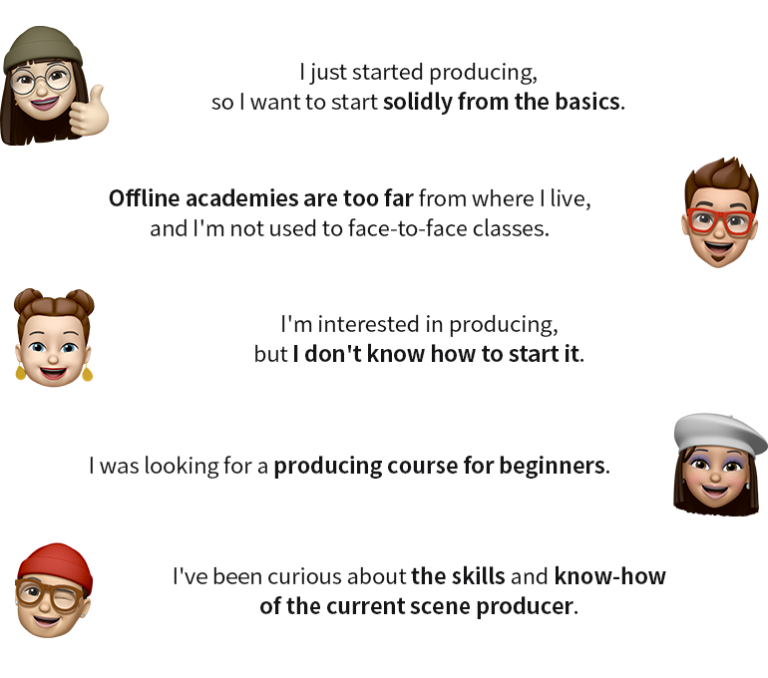
In just 12 weeks,
learn the basics of K-POP production
and take the first step in your professional debut.
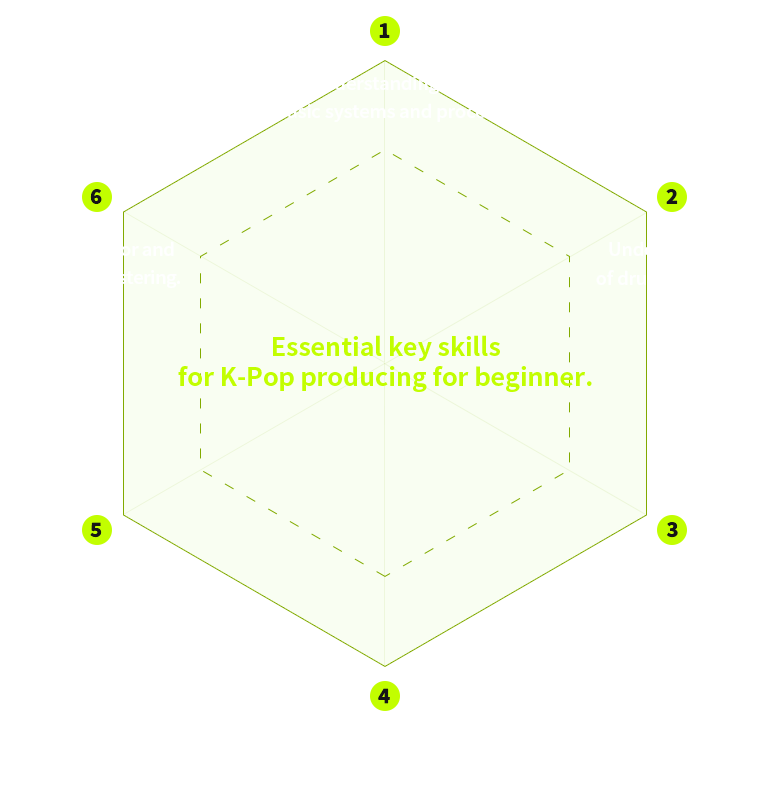
In just 12 weeks,
learn the basics of K-POP producing and take the first step in your professional debut.

We provide practical theory and various hands-on processes
so that even those who are new to it can easily learn how to produce.
If you stay committed to this process,
you will be able to learn the essential skills needed to debut as a K-POP producer


Step 01. Basic Theory
After learning the basic theory for the foundation of producing and practicing with an assignment.
1) Basic understanding of DAW, equipment, and producing process.
2) Understanding basic rhythmic Instruments for track production.
3) Understanding various chords progression, the basics of toplining and vocal production.
4) Understanding effector plug-ins and arrangements, and demo mix & mastering.
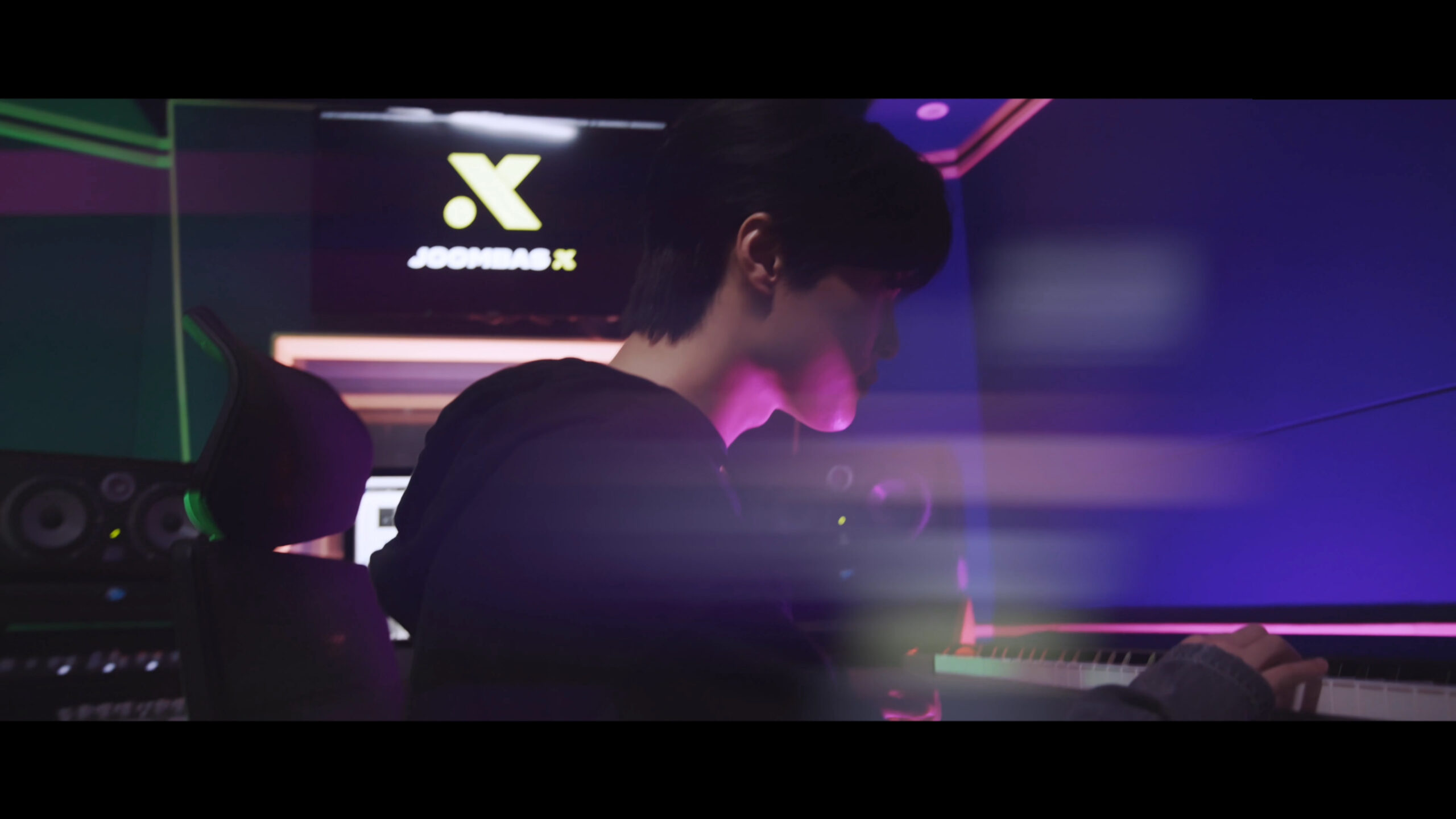
Step 02. Practical Methods:
Based on the basic theory, learn how to implement a real track through various examples.
1) Drums: Rhythm arrangement and usage. / Bass: How to play and utilization.
2) Chord: A chord progression using basic and advanced theory.
3) Vocal production: Vocal directing method and practical recording.
4) Effector and arrangement: How to use effectors and the Importance of track/melody arrangement.
5) Demo Mix & Mastering: Basics of demo mix & mastering method for producers.
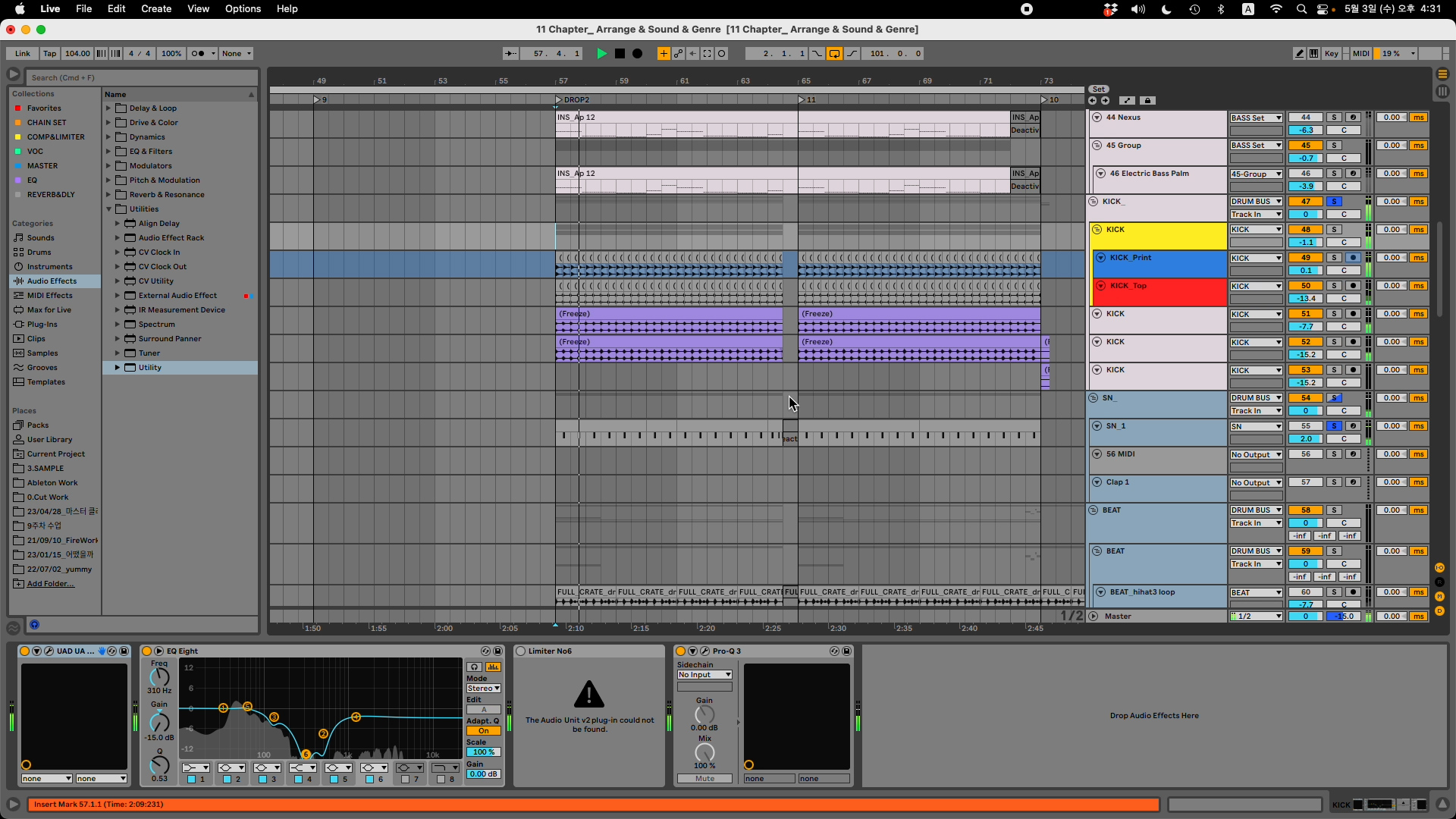
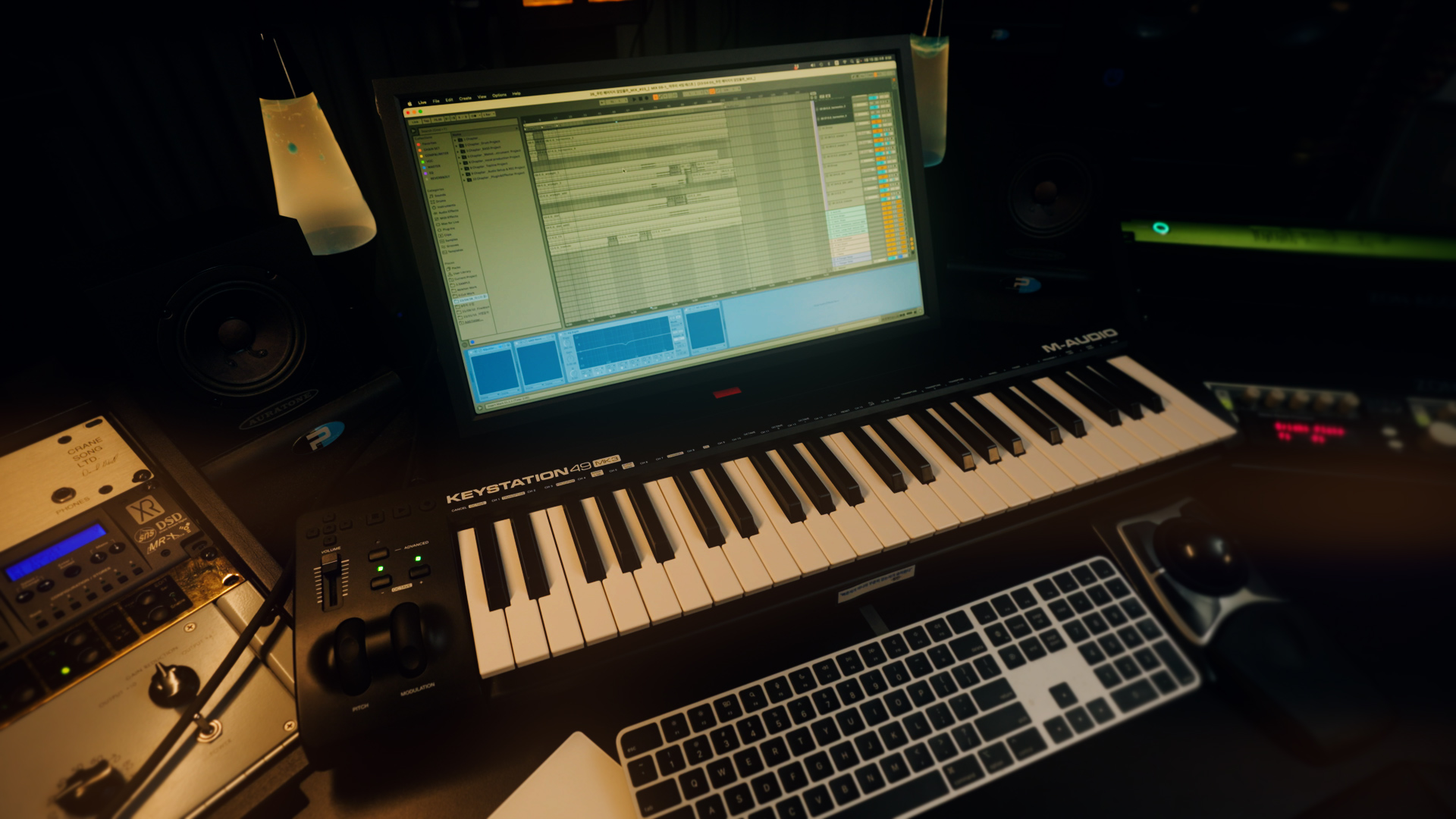
Step 03. Hands-on Training:
Create your tracks using various sample sources provided by the instructor.
1) Drum and bass track production.
2) Create more than 5 chord progressions.
3) Create a concise toplining and vocal track recording.
4) How to use the effects and make a rich sound track through the arrangement.
We provide practical theory and various hands-on processes
so that even those who are new to it can easily learn how to produce
If you stay committed to this process,
you will be able to learn the essential skills needed to debut as a K-POP producer


Step 01. Basic Theory
After learning the basic theory for the foundation of producing and practicing with an assignment.
1) Basic understanding of DAW, equipment, and producing process.
2) Understanding basic rhythmic Instruments for track production.
3) Understanding various chords progression, the basics of toplining and vocal production.
4) Understanding effector plug-ins and arrangements, and demo mix & mastering.
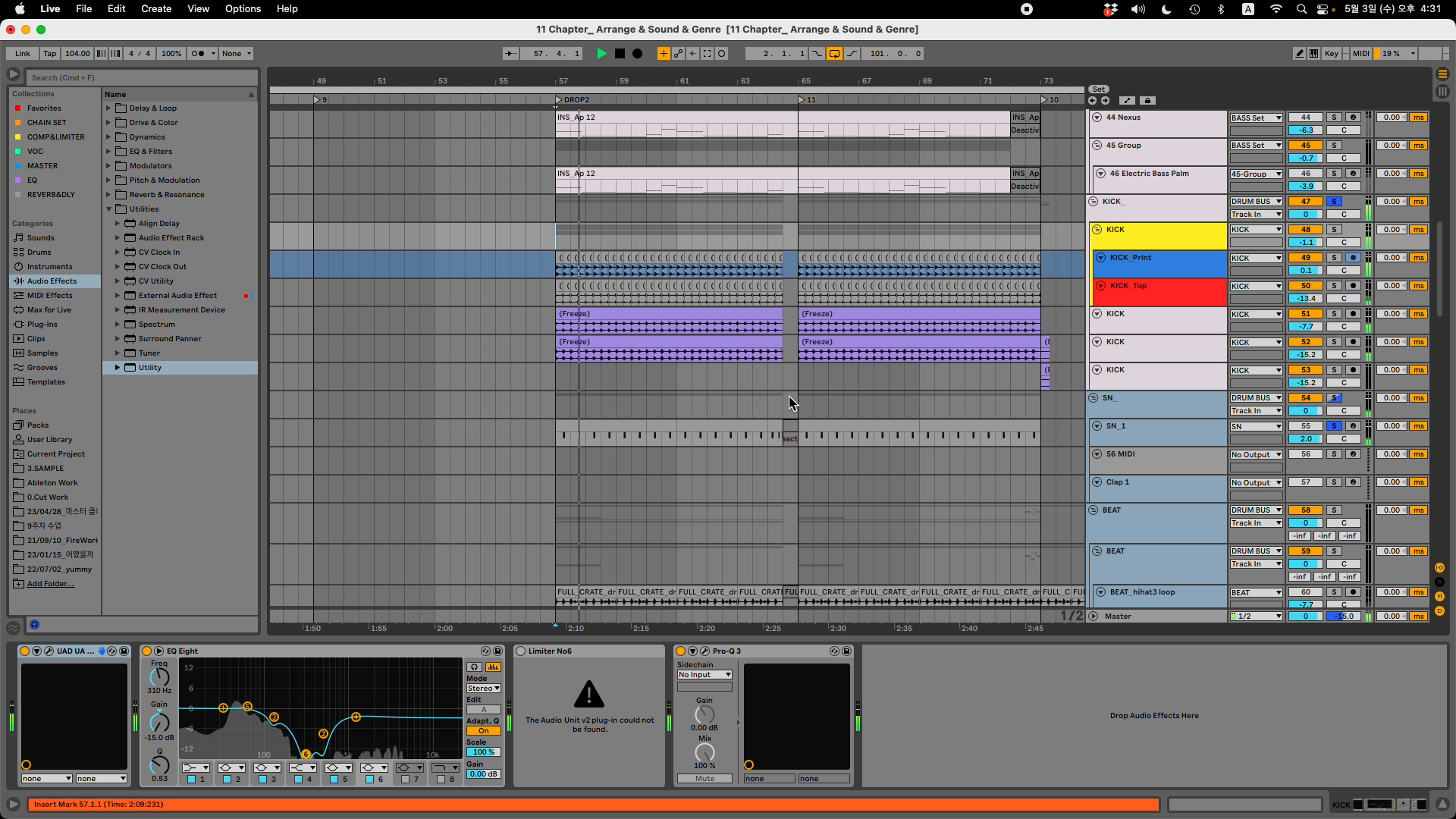
Step 02. Practical Methods
Based on the basic theory, learn how to implement a real track through various examples.
1) Drums: Rhythm arrangement and usage. / Bass: How to play and utilization.
2) Chord: A chord progression using basic and advanced theory.
3) Vocal production: Vocal directing method and practical recording.
4) Effector and arrangement: How to use effectors and the Importance of track/melody arrangement.
5) Demo Mix & Mastering: Basics of demo mix & mastering method for producers.


Step 03. Hands-on Training
Create your tracks using various sample sources provided by the instructor.
1) Drum and bass track production.
2) Create more than 5 chord progressions.
3) Create a concise toplining and vocal track recording.
4) How to use the effects and make a rich sound track through the arrangement.
What you will get out of this course.

More than 7 different tracks
Create more than 7 different types of tracks with hands-on assignments based on week-by-week lessons.

Various sample sources and files
For track production, you will get various sample sources and files provided by the instructor.

Alumni
After the end of your course, you will be able to join a community of alumni that have also completed all relevant courses.

Priority selection for challenges
After the end of the course, you will be given priority in various producing/toplining participation challenges of Joombas X.
What you will get out of this course.

More than 7 different tracks
Create more than 7 different types of tracks with hands-on assignments based on week-by-week lessons.

Various sample sources and files
For track production, you will get various sample sources and files provided by the instructor.

Alumni
After the end of your course, you will be able to join a community of alumni that have also completed all relevant courses.

Priority selection for challenges
After the end of the course, you will be given priority in various producing/toplining participation challenges of Joombas X.
An exclusive Joombas X course for producing featuring insights and knowledge from an experienced and active K-POP producer!
An exclusive Joombas X course for producing featuring insights and knowledge from an experienced and active K-Pop producer!
Seul-gi Park (20Hz)
Seul-gi Park (20Hz) is a veteran producer and composer with numerous hit songs. He is active in songwriting and MIDI programming, showing great talent and competence. He has produced music for global K-POP stars such as SEVENTEEN, IZ*ONE, EXO SUHO, Monsta X, TWICE, etc.


Seul-gi Park (20Hz)
Seul-gi Park (20Hz) is a veteran producer and composer with numerous hit songs. He is active in songwriting and MIDI programming, showing great talent and competence. He has produced music for global K-POP stars such as SEVENTEEN, IZ*ONE, EXO SUHO, Monsta X, TWICE, etc.
representative song

IZ*ONE(아이즈원)
Violeta

Monsta X
Lost In The Dream

EXO SUHO
Grey Suit

SUPER JUNIOR
THIS IS LOVE

OH MY GIRL
심해(마음이라는 바다)
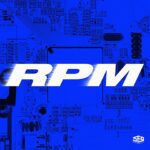
SF9
Round And Round
Check out reviews from previous course graduates.
* These are reviews of those who took the previous live Bootcamps.

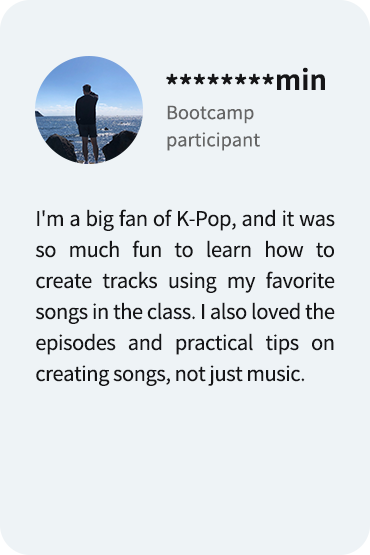
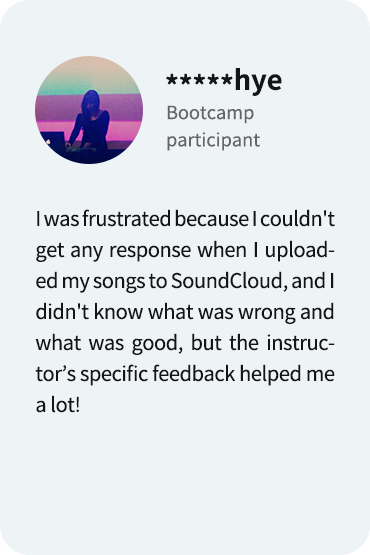

Check out reviews from previous course graduates.




Get all these benefits, at the most reasonable price!

Get all these benefits,
at the most reasonable price!

Are you ready to become a hit K-pop producer?
Everyone, please follow me diligently! We will make the way for you.
Course Schedule
The entire course will be conducted online.
Mon
The weekly VOD will be released every Monday
Tues Wed Thur Fri Sat
Watch VOD lectures any time during the week
- Study at your own pace – you will be able to access the VOD’s at any time during the week.
- The lecture is approximately one hour long and is accessible from any mobile, tablet, or PC device.
Any and all answers will be provided during weekly Q&A sessions
- Upload questions to the Q&A channel at your convenience.
- The instructor will respond to your questions within 2-3 days.
All assignments are to be submitted by midnight every Saturday night
- Feedback may not be provided for assignments submitted past the deadline.
- To avoid this, please be sure to submit your assignment before midnight on Saturday!
Sun
Professional mentors will provide feedback on submitted assignments.
Course Schedule
The entire course will be conducted online.
Mon
The weekly VOD will be released every Monday
Tues Wed Thur Fri Sat
Watch VOD lectures any time during the week
- Study at your own pace – you will be able to access the VOD’s at any time during the week.
- The lecture is approximately one hour long and is accessible from any mobile, tablet, or PC device.
Any and all answers will be provided during weekly Q&A sessions
- Upload questions to the Q&A channel at your convenience.
- The instructor will respond to your questions within 2-3 days.
All assignments are to be submitted by midnight every Saturday night
- Feedback may not be provided for assignments submitted past the deadline.
- To avoid this, please be sure to submit your assignment before midnight on Saturday!
Sun
Professional mentors will provide feedback on submitted assignments.
Detailed curriculum
Topic Introduction to the instructor / Understanding DAWs, sequencing, and basic equipment / Understanding producing
Assignment Introduce yourself + showcase your gear (if you don’t have any, figure out what you’re buying and showcase it)
Topic Types of drums and how to use them / Understanding and placing rhythms and positions / Types of beats and how to use them / Application of swing and performance
Assignment Using the instructor’s samples, create a drum track based on week 2 lecture.
Topic Types of Bass / How to Play and Position the Bass / Understanding and Utilizing the 808 Bass
Assignment Using the instructor’s samples, create a bass track based on week 3 lecture.
Topic Understanding Scales (Major, Minor) / Understanding Chords / Chord Progressions and Surrogate Chords
Assignment Create a track with five chords based on the lecture.
Topic Types of Melody Instruments / How to Use Melody Instruments / What Melody Instruments Do
Assignment Utilize the practice midi provided to fill in the sounds with various instruments and the drum samples used in the lecture. And then submit the track.
Topic What is vocal production (Lead, Doubling BGV, Skit, Radio, etc.) / The process of recording a vocal file / For Autotune, Melodyne, etc.
Assignment Proceed and submit a vocal recording following the instructor’s example track (recording the same basic vocal track as the writer’s track, reflecting the elements of lead vocals, ad-libs, doubling, chorus.etc).
Topic Advanced Chord (7th Chord, SUS2, SUS4, DIM, etc.) / Secondary Dominant / Money Chord & Voicing / Relayed to Minor Chord
Assignment Create your own chord progression using 7th chords, SUS4, DIM, Augments, etc. and submit a MIDI file with secondary dominants.
Topic Understanding toplining / Basics of toplining methods (chordal, tension, chromatic, motif toplines, etc.) / Toplining arrangements
Assignment Create and submit a topline track following the instructor’s example track (reflecting chord tones, tension, chromaticism, rhythm, Skit, Radio, and Low/Up Pitch elements).
Topic Equipment needed and setting up the environment for recording / Understanding the audio system / How to direct vocals and how to actually record them / Compressor, EQ: setting up the data for a great sounding recording
Assignment Record your own audio using the provided recording level data, set it up, and submit it.
Topic Understanding plugins / Types of effects / Dynamic parts (types and understanding of compressors, types and understanding of EQ) / How to use effects
Assignment Enrich the track by adding comps, reverbs, and other effects you learned in the lecture to the stem file provided by the instructor and submit it.
Topic Understanding how to arrange (tracks and melodies) / Arrangement order / Importance of rhythmic arrangements (4- and 8-bar rhythms) / Arrangement caveats
Assignment Utilize the chords and drums provided and arrange them in a variety of ways and submit (free genre)
Topic Understanding & Preparing to Mix & Master a Demo / Order of the Mix / Vocal Mix / Goals of Demo Mastering / Level Loudness War
Assignment Progress and submit a demo mix master using one of the work tracks you created as a mission during the course.
Detailed curriculum
Topic Introduction to the instructor / Understanding DAWs, sequencing, and basic equipment / Understanding producing
Assignment Introduce yourself + showcase your gear (if you don’t have any, figure out what you’re buying and showcase it)
Topic Types of drums and how to use them / Understanding and placing rhythms and positions / Types of beats and how to use them / Application of swing and performance
Assignment Using the instructor’s samples, create a drum track based on week 2 lecture.
Topic Types of Bass / How to Play and Position the Bass / Understanding and Utilizing the 808 Bass
Assignment Using the instructor’s samples, create a bass track based on week 3 lecture.
Topic Understanding Scales (Major, Minor) / Understanding Chords / Chord Progressions and Surrogate Chords
Assignment Create a track with five chords based on the lecture.
Topic Types of Melody Instruments / How to Use Melody Instruments / What Melody Instruments Do
Assignment Utilize the practice midi provided to fill in the sounds with various instruments and the drum samples used in the lecture. And then submit the track.
Topic What is vocal production (Lead, Doubling BGV, Skit, Radio, etc.) / The process of recording a vocal file / For Autotune, Melodyne, etc.
Assignment Proceed and submit a vocal recording following the instructor’s example track (recording the same basic vocal track as the writer’s track, reflecting the elements of lead vocals, ad-libs, doubling, chorus.etc).
Topic Advanced Chord (7th Chord, SUS2, SUS4, DIM, etc.) / Secondary Dominant / Money Chord & Voicing / Relayed to Minor Chord
Assignment Create your own chord progression using 7th chords, SUS4, DIM, Augments, etc. and submit a MIDI file with secondary dominants.
Topic Understanding toplining / Basics of toplining methods (chordal, tension, chromatic, motif toplines, etc.) / Toplining arrangements
Assignment Create and submit a topline track following the instructor’s example track (reflecting chord tones, tension, chromaticism, rhythm, Skit, Radio, and Low/Up Pitch elements).
Topic Equipment needed and setting up the environment for recording / Understanding the audio system / How to direct vocals and how to actually record them / Compressor, EQ: setting up the data for a great sounding recording
Assignment Record your own audio using the provided recording level data, set it up, and submit it.
Topic Understanding plugins / Types of effects / Dynamic parts (types and understanding of compressors, types and understanding of EQ) / How to use effects
Assignment Enrich the track by adding comps, reverbs, and other effects you learned in the lecture to the stem file provided by the instructor and submit it.
Topic Understanding how to arrange (tracks and melodies) / Arrangement order / Importance of rhythmic arrangements (4- and 8-bar rhythms) / Arrangement caveats
Assignment Utilize the chords and drums provided and arrange them in a variety of ways and submit (free genre)
Topic Understanding & Preparing to Mix & Master a Demo / Order of the Mix / Vocal Mix / Goals of Demo Mastering / Level Loudness War
Assignment Progress and submit a demo mix master using one of the work tracks you created as a mission during the course.
More questions?
FAQ
Beginner-level producers who can understand the production process and basic terminology, as well as intermediate-level producers who can produce tracks but still lack details, can take this course.
Recommended for those who have a basic understanding of basic production terminology and DAW(sequencers).
Best suited for those who have worked with DAW (Sequencer) at least once before.
You can take the course without knowing the basic knowledge of K-POP and general music theory.
Anyone who enjoys listening to and liking K-POP is welcome.
You don’t have to use the same equipment as the instructor, just make sure you have the basics for the course.
Even if you’re already familiar with a topic, we recommend taking it at least once to refresh your memory. It’s also recommended that you take the course more than once, as different instructors and authors may have different styles and approaches to the same topic.
It can be taken concurrently with other courses. No matter how many courses you take, there is no limit to concurrent enrollment.
Depending on your academic achievement, you can take the next level. Even if you have low learning achievement or understanding, you can take the next level class, but since it is an beginner level, we recommend that you familiarize yourself with all the contents of the course.
There is no age limit for registering for and taking courses.
More questions?
FAQ
Beginner-level producers who can understand the production process and basic terminology, as well as intermediate-level producers who can produce tracks but still lack details, can take this course.
Recommended for those who have a basic understanding of basic production terminology and DAW(sequencers).
Best suited for those who have worked with DAW (Sequencer) at least once before.
You can take the course without knowing the basic knowledge of K-POP and general music theory.
Anyone who enjoys listening to and liking K-POP is welcome.
You don’t have to use the same equipment as the instructor, just make sure you have the basics for the course.
Even if you’re already familiar with a topic, we recommend taking it at least once to refresh your memory. It’s also recommended that you take the course more than once, as different instructors and authors may have different styles and approaches to the same topic.
It can be taken concurrently with other courses. No matter how many courses you take, there is no limit to concurrent enrollment.
Depending on your academic achievement, you can take the next level. Even if you have low learning achievement or understanding, you can take the next level class, but since it is an beginner level, we recommend that you familiarize yourself with all the contents of the course.
There is no age limit for registering for and taking courses.
